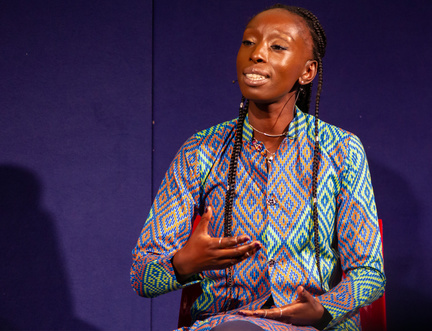More articles Saturday 17 August 2019 4:00pm
“If you’re an uber driver, you have more protection” than fashion models, says Eunice Olumide

Supermodel and fashion sustainability spokeswoman Eunice Olumide appeared at the Book Festival on Thursday to discuss her new book, the issues she’s faced with racism in the fashion industry and how we should all try to slow down ‘fast fashion’, in an event chaired by New York Times style reporter, Elizabeth Paton.
The book, How to Get Into Fashion: A Complete Guide for Models, Creatives and Anyone Interested in the World of Fashion came about after Olumide spent “literally years” of her life replying to individual messages asking ‘How do I get into fashion?’. The idea started out as a successful blog. As a passionate believer in rights and regulations around working in fashion, the book serves as a guide for a variety of aspects of the industry.
“I was going to self-publish the book, because it was really about providing information that would prevent exploitation, because the fashion industry is quite parochial in terms of people's understanding of how to get into it. And because there isn't significant regulation, it means that people can get into situations whereby they’re exploited.
“If you’re an Uber driver, you have more protection, rights and unions than you do if you’re a fashion model. Which is quite strange you know, especially considering we often start at quite a young age, fourteen/fifteen years old and it just means if you have an issue you don’t necessarily have anywhere to go to get help and support.
“You shouldn’t be able to do any job without such basic legal stipulations, In my opinion. I think the good and the bad thing about the fashion industry, it’s one of the last bastions or areas within society that we haven’t investigated yet how it works internally.”
During Olumide’s fifteen year career in the fashion industry she’s drawn the line at certain things, notably modelling underwear, bikinis or nude. This has led to a backlash from designers and resulted in her being considered ‘difficult’, a racist sentiment Olumide says, that has followed dark skinned women for centuries.
“One of the kind of remnants of the transatlantic slave trade and colonialism, I think, for women of color, particularly dark skinned women, is this kind of stereotype and kind of representation of dark skinned women as being really aggressive, really difficult. We’re always kind of represented in a very caricature way. I found that quite frustrating that people would say I was difficult because I had respect for myself.
“I remember I had an agent, basically I had one agent drop me because I refused to relax my hair. It’s like a big thing that dark skinned women can’t be seen with an afro. We’re pushing against that now, but for much of my life whenever you see dark skinned women represented in the media, they would always be wearing a wig.
“You might not be aware of that, but it’s quite a serious issue within our community, the way that we’re Europeanised and our natural hair is seen as unprofessional.”
One of the things Olumide is most passionate about is sustainability. She champions the #thirtywears campaign that seeks to slow down ‘fast fashion’ by imploring people to wear the clothes they own for a minimum of thirty wears. The movement is also championed by figures like Emma Watson who recycles her dresses for premieres.
Speaking about the movement, Oludmide said it’s “about making people feel comfortable and easy about wearing the same clothes. You know, one of the biggest things we can do to change the impact of the textile industry in the world is literally wearing stuff more, buying less or as little as possible, or making our own clothes from fabrics which will decompose.
“Those three things alone could completely revolutionise where we are today.”

 Major new partnership with Celtic Connections
Major new partnership with Celtic Connections 

